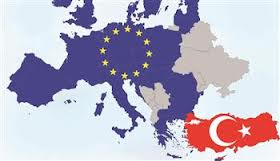 The European Union decided Tuesday to revive long-dormant EU membership talks with Turkey, but not until later this year because of the government’s heavy-handed crackdown on street protests in Istanbul and elsewhere earlier this month.
The European Union decided Tuesday to revive long-dormant EU membership talks with Turkey, but not until later this year because of the government’s heavy-handed crackdown on street protests in Istanbul and elsewhere earlier this month.
Ministers from the 27-nation bloc in Luxembourg decided to resume the negotiations if a report assessing Turkey’s ability to fit within the EU — due in October — signals a go-ahead.
Turkish Foreign Minister Ahmet Davutoglu said “a hurdle standing in the way of relations between the EU and Turkey has been overcome.” His office added that Turkey remains determined to meet the economic and political criteria demanded by the EU, “despite all hurdles that are put in front of it.”
The talks were initially scheduled to open this week, but Germany and others blocked them because of concerns that such negotiations could appear to endorse the crackdown on the demonstrations, which rights groups say has left thousands injured.
The bloc’s foreign ministers first floated a compromise proposal to delay the talks on Monday, in a bid to avoid jeopardizing the long-term goal of forging closer ties with Turkey, a NATO member and also an increasingly influential player in the Middle East.
“While we have been disturbed by the reaction to the recent peaceful protests in Turkey, I believe that the EU accession process is the most effective tool we have in influencing the reform agenda in Turkey,” said Irish Foreign Minister Eamon Gilmore. “EU-inspired reforms have facilitated the increasing space for peaceful protest and dissenting voices,” he added.
Turkey began EU accession negotiations in 2005, but has made little progress because of its dispute with EU member Cyprus, as well as opposition among some in Europe to admitting a populous Muslim nation into the bloc. The next session of the EU talks will focus on regional policies, one of 35 chapters for aspiring members to address.
The protests began in Istanbul on May 31 and quickly turned into widespread demonstrations against the heavy-handed crackdown and against Prime Minister Recep Tayyip Erdogan’s increasingly authoritarian and meddlesome ways.
Erdogan, who took power a decade ago, denies he is authoritarian and, as evidence of his popularity, points to elections in 2011 that returned his party to power with 50 percent of the vote and gave him a third term in office.
ABC news

Leave a Reply
You must be logged in to post a comment.